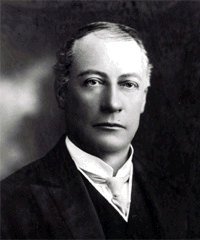Charles Wade facts for kids
Quick facts for kids
Sir Charles Wade
|
|
|---|---|
 |
|
| Justice of the Supreme Court of New South Wales | |
| In office 15 March 1920 – 26 September 1922 |
|
| 17th Premier of New South Wales | |
| In office 2 October 1907 – 1 October 1910 |
|
| Governor | Sir Harry Rawson Lord Chelmsford |
| Preceded by | Sir Joseph Carruthers |
| Succeeded by | James McGowen |
| Member of the New South Wales Parliament for Gordon |
|
| In office 6 August 1904 – 21 February 1917 |
|
| Preceded by | New district |
| Succeeded by | Thomas Bavin |
| Personal details | |
| Born | 26 January 1863 Singleton, Colony of New South Wales, Australia |
| Died | 26 September 1922 (aged 59) Potts Point, New South Wales, Australia |
Sir Charles Gregory Wade (born January 26, 1863 – died September 26, 1922) was an important leader in New South Wales, Australia. He served as the Premier of New South Wales from 1907 to 1910. People remembered him as an honest and brave public servant. He was a judge for a short time, and his strong sense of fairness made him very good at that job.
Contents
Early Life and Education
Charles Gregory Wade was born in Singleton, New South Wales. His father, William Burton Wade, was a civil engineer. Charles went to All Saints College, Bathurst and The King's School in Parramatta. He was a very bright student.
University and Sports Achievements
Charles won important scholarships to study at Merton College, Oxford in England. He did very well in his studies, earning a degree in classics in 1884. He was also a talented athlete. He played rugby union for his university and for the England team eight times. He was the first player to score three tries in one game (a "hat-trick") against Wales. He also played county cricket for Herefordshire and Shropshire. Besides that, he was good at lawn tennis, rowing, and target shooting.
Becoming a Lawyer
In 1886, Charles became a barrister, which is a type of lawyer. He then returned to Sydney, Australia. In 1890, he married Ella Louise Bell. Charles became known as a skilled lawyer. He worked as a crown prosecutor, representing the government in court. He also served as an acting judge in the District Court from 1896 to 1902. After that, he worked for employers in the new Industrial Arbitration Court.
Political Career
In September 1903, Charles Wade was elected to the New South Wales Legislative Assembly, which is like the state parliament. He represented the area of Willoughby. Later, from 1904 to 1917, he represented the Gordon area.
Serving as Premier
Within a year of being elected, he joined the government led by Joseph Carruthers. Charles became the Attorney-General and Minister for Justice. When Carruthers stepped down, Charles Wade became the Premier of New South Wales on October 2, 1907. He kept his previous roles as well.
As Premier, Charles Wade was a very active leader. His government passed many new laws. These laws helped with things like arguments between workers and employers, supporting children who were neglected, setting minimum wages, and dealing with alcohol issues. They also worked on how land was settled and used.
His government also lowered some taxes. Each year, the government had extra money left over. A big project called the Burrinjuck Dam was started under his leadership. This dam was important for water supply. The government made sure that the land value increase from the dam would benefit everyone, not just landowners.
Challenges and Later Roles
During a coal strike in 1909–1910, Charles Wade seemed to support the mine owners. This caused him to lose some public support. Despite his good work, his party lost the next election. A Labour government took over on October 21, 1910, and Charles Wade became the leader of the opposition.
Later, in 1916, there was a disagreement within the Labor party about conscription (forcing people to join the military). This led to a new government being formed. Charles Wade helped with these talks, but his health was not good enough for him to take a government job.
He later went to London for a holiday. When his health improved, he became the Agent-General for New South Wales. This role meant he represented New South Wales in London. In 1919, he published a book called Australia, Problems and Prospects, based on lectures he gave. In December 1919, Charles Wade was appointed a judge of the Supreme Court of New South Wales in Sydney. He started this job in March 1920.
Charles Wade passed away after a heart attack at his home in Potts Point, New South Wales on September 26, 1922. He was survived by his wife, two sons, and two daughters. His funeral was held at St. Andrew's Cathedral, Sydney, and he was buried at South Head General Cemetery.
Honours and Recognition
Charles Wade received several important honours during his life.
- He became a King's Counsel on March 6, 1905. This is a special title for experienced lawyers.
- He was made a Knight Bachelor in 1918, which means he could use "Sir" before his name.
- He was also given the title of KCMG on June 5, 1920.
See also
- List of Six Nations Championship hat-tricks
 | Delilah Pierce |
 | Gordon Parks |
 | Augusta Savage |
 | Charles Ethan Porter |

